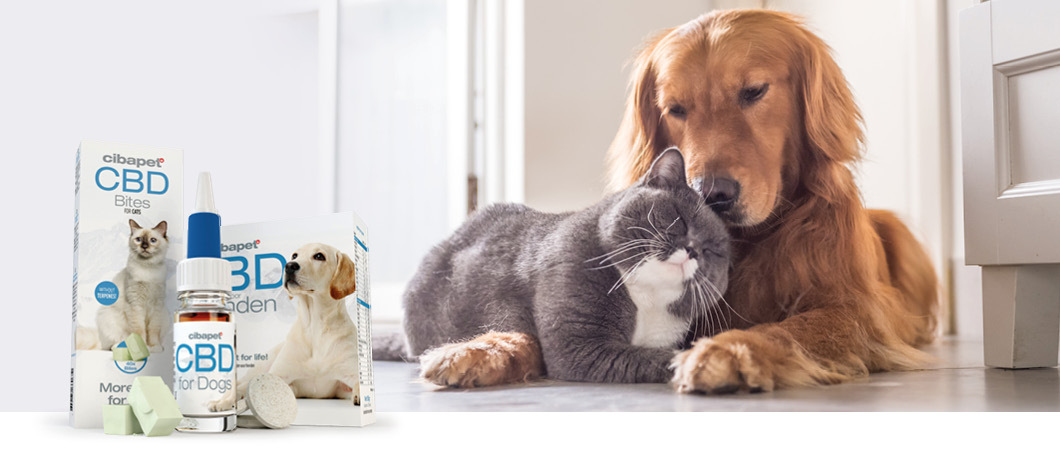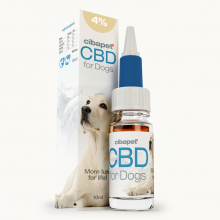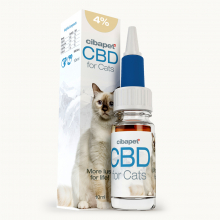6 Ways CBD Oil Could Help Your Pet
Last updated:
Published:

Humans aren't the only ones that benefit from the balancing influence of CBD—pets do too! Keep reading to find out how CBD could restore your pet's lust for life as we dive into the research surrounding six critical health conditions.
CBD for pets
Just like us, our beloved pets possess an endocannabinoid system (ECS), a vast network responsible for monitoring functions such as digestion, mood, and sleep. And where there's an ECS, there's potential for CBD to influence mental and physical well-being. Fortunately, this principle applies to all cats and dogs—big, small, old, or young.
Whether you're a devoted cat owner or can't imagine life without your canine companion, CBD could play a crucial role in keeping your pet looking and feeling great. If you're interested in using the power of cannabidiol to enhance your pet's well-being, below is a summary of its potential for six health conditions.
1. Joint problems
Sadly, joint discomfort and problems with mobility are common among many dogs, especially larger breeds such as Labradors, retrievers, and German shepherds. While weight management and a healthy diet can help keep symptoms under control most of the time, it doesn't hurt to give your friend a helping hand.
Luckily, that's precisely what researchers at Baylor College of Medicine thought when they assessed the therapeutic potential of cannabidiol (CBD) in arthritic dogs. As part of a double-blind placebo-controlled study, researchers tested both regular and liposomal CBD in dogs with osteoarthritis.
After four weeks, researchers assessed that CBD "increased mobility in a dose-dependent fashion”. Essentially, the more severe the symptoms, the greater the dose of CBD needed. Researchers also noted that there was "no significant detrimental impact of CBD administration".
2. Seizures and epilepsy
In humans, CBD and epilepsy have a significant relationship. From the use of Epidiolex (an FDA-approved version of CBD) in children with treatment-resistant epilepsy to a wealth of comprehensive reviews on the subject, the evidence is increasingly positive.
The hope, of course, is that the similarity in mechanism of action means the compound could prove just as effective in pets.
Fortunately, an important breakthrough came from researchers at the College of Veterinary Medicine and Biomedical Sciences, as they turned their attention to the impact of CBD on dogs with intractable idiopathic epilepsy.
Although the sample size was small, the findings noted "no adverse behavioural effects" from CBD consumption.
3. Anxiety
Just like their owners, anxiety can affect pets at any time. Some pets get anxious when travelling, while others don't like loud noises such as fireworks. However, no matter the cause of a pet's anxiety, most instances manifest in unwanted behaviour. At best, this may be destroying their favourite toy, but it can also be much worse.
Encouragingly, an observational study on privately owned dogs showed favourable outcomes among pets given a CBD-containing pet chew. After two weeks, owners reported that the proprietary blend of CBD and other nutraceuticals had the "potential to decrease negative dog behaviours" while encouraging playfulness. Moreover, this study is one of a handful that also examined dosing, finding the dog's weight to alter the recommended amount of daily chews.
4. Stress
The impact of chronic stress is just as severe for our pets as it is for us, and over time, it can contribute to various mood disorders and behavioural issues. However, the first step in addressing a chronically stressed pet is looking for the signs.
You'll know your pet better than anyone else, but several key indicators include isolation, aggression, decreased appetite, and increased sleep. If you do spot these behaviours, the good news is that CBD could play a pivotal role in addressing mood disturbances brought on by stress.
Although not specific to cats and dogs, a study from the University of São Paulo highlights a mechanism of action that could apply to our beloved pets. The study suggests that once we better understand how CBD impacts depressive symptoms, we can better tailor the cannabinoid’s effects to humans and pets.
5. Allergies
While specific studies into the effect of CBD on allergy symptoms are lacking, we do know a little about the compound’s proposed effects on the immune system. Those, combined with the compound’s excellent synergy with other ingredients, make it a prime target for potentially soothing allergy symptoms.
Of course, the most effective formula will depend on the type of allergy (flea, food, or environmental) and the delivery method. A 2018 study found that matching the cannabinoid delivery system to the symptom is crucial for addressing these issues. If an allergy manifests as patches of inflamed, red skin, for example, then you'll want to apply a cannabinoid-infused topical cream for the best results.
6. Sleep
Although it may seem like pets can sleep anywhere, at any time, they can indeed fall victim to sleep problems. Pets with conditions such as narcolepsy and REM sleep disorder usually require specialised treatment, but if you suspect your pet could do with a general boost in the sleep department, then CBD may help.
An animal model study systemically administered CBD to several male rats, finding them to display improved sleep times compared to placebo. The study also points to potential improvements in sleep latency during the day (wakefulness). Dosing guidelines will differ significantly from a rat to a dog or cat, but the research suggests a promising interaction between CBD and enhanced sleep quality.
CBD for pets: Q&A
With six potential benefits of CBD oil for pets covered, it's time to clarify general questions about CBD-infused pet products. Whether it's pet-focused CBD oils or infused treats, bites, and chews, here are some of the most common questions, answered.
- Is CBD oil for pets safe?
- While the evidence certainly looks positive for pets and CBD, it's important to remember that every pet is different. We always advise humans to be thoughtful and take CBD at their own pace, and the same applies to cats and dogs.
- How do I give my pet CBD?
- One of CBD's greatest strengths is its versatility, meaning you'll find it in oils, chews, and treats. However, for the most common choice, CBD oil, you can try applying a few drops directly into your pet's mouth. If that's easier said than done, simply add the same number of drops to their food or water.
- What side effects does CBD have?
- Most studies have recorded limited side effects in pets, but you should still know what they are. CBD can cause dry mouth, low blood pressure, and drowsiness in some cats and dogs. Most of these side effects will be mild at best, but be aware that they are more likely to occur at higher doses.
- What is the ideal dose of CBD oil for pets?
- The ideal dose of CBD will depend on your pet’s age, breed, sensitivity, and lifestyle. As such, you should start with a lower than average dose and build gradually to see how they respond to CBD. Once you achieve the desired effect, maintain a consistent dose and frequency.
- Where do I buy CBD oil for my pet?
- Cibdol offers an exclusive range of CBD oils, treats, and bites aimed at cats and dogs. Our CBD pet formulas explicitly cater to our furry friends for the best possible experience. Shipping to homes all over Europe, you can find the full range on our CBD products page.
Whether you're interested in trying CBD for yourself or your pet, visit the Cibdol store for a comprehensive selection of oils, creams, capsules, supplements, and more. Or, if you want to learn more about the benefits of CBD for pets, visit our CBD Encyclopedia.















